
Janine Niepce Paris ca. 1950

Great example of why there is a housing bubble everywhere, from a guest writer at Wolfstreet. The second graph is priceless. “The very premise of Swedish society is under attack..”
• The Central Bank Shell Game (WS)
Sweden’s welfare state supposedly allows for success while providing a safety net for those unable to keep up with the market. In principle, it is an ideal, utopian-like state. However, Sweden’s touted economic success has come at the expense of its currency, the Krone (SEK), and long-term sustainability. Riksbank, the Swedish Central Bank, like its European contemporaries, has undertaken experimental policy, driving real and nominal interest rates below zero. Since 2014, Swedish deposit rates have been negative. Not only has overall negative real interest rate policy affected housing, but it also drove Swedish consumers deeper into debt. Embarking on the dual mandate policy may have staved off recession, but it created greater problems for the future.
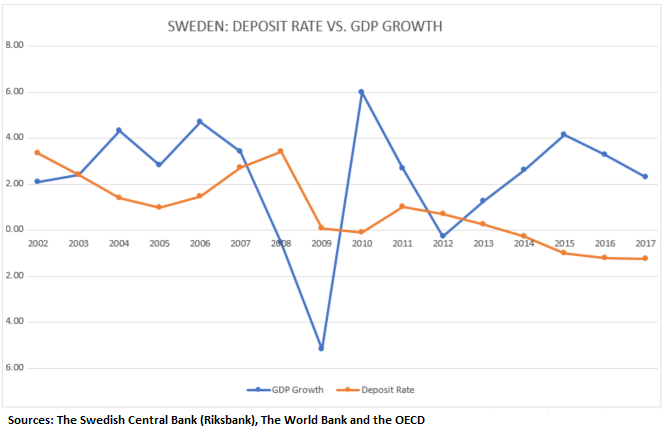
Although current deposit rates are at a record low of -1.25%, the latest GDP print came in at 2.3%, and the growth rate has been tapering since 2015. Sweden’s “hot” GDP growth – hot relative to the region – could be attributed, not to industrial growth, but rather increased government spending, funding social programs. Additionally, with no incentive to save, consumer debt has taken off, along with the housing prices, while disposable income lagged. Swedish household debt is now at a record high. Hence, the Swedish growth story is not organic but rather a borrow-and-spend one.
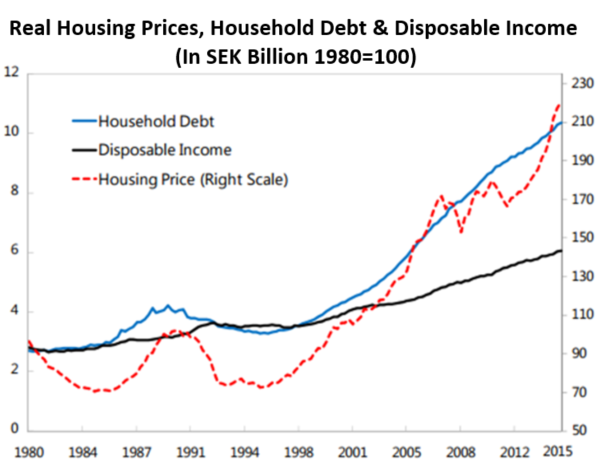
Swedes, like Norwegians, are victims of the “exchange rate versus housing price shell game.” The SEK received today for the sale of their inflated flats has fallen 30% against the US dollar (average USDSEK in 2014 was 6.86 vs. 8.95 on March 15, 2017). Stockholm housing rose 31% during the same period in SEK terms, negating the recent gains over the same period. The SEK fell 23% against gold in the same period. Hence, the “Swedish Model” is under attack. The egalitarian underpinnings, unwinding with the negative rates, are driving a wedge into Swedish society, creating extremes on both sides of the economic spectrum. The rampant consumerism, encouraged by artificially low rates, continues to widen the wealth gap. Coincidentally, the middle class deteriorated the most between 2014 and 2015: the same time that deposit rates took a dive. Furthermore, the negative savings rates are driving the average person to “gamble” on speculative investments instead of saving and building a future over the long term.
[..] instead of undertaking experimental rate policy, Riksbank and the Swedish government should be engineering a soft-landing or a “controlled crash”, adjusting taxes and policy to ensuring a smooth transition to sustainability for the general population. There is precedent from Iceland that already exists. It is clear that the negative rate experiment is neither sustainable nor helpful to economic growth. It only inflates bubbles while widening the wealth gap in Swedish society. A once prudent and financially conservative people are now getting drunk on debt, wrecking their future. The very premise of Swedish society is under attack.

Everybody does it. When people start borrowing less from banks for housing, economies will collapse. Superannuation is sort of like Australia’s 401(K).
• Using Superannuation For Deposit ‘Irresponsible’ – Keating (Nine)
Former prime minister Paul Keating has labelled as “scandalous” the Turnbull government’s suggestion it might allow young people to raid their superannuation for house deposits. Ahead of the May budget, Mr Keating argues the idea would rob younger Australians of a large block of savings at the end of their working lives. “As an economic idea, this is scandalous. But, of course, for the Liberal Party, this is an ideological proposal,” he writes in Fairfax Media today. Mr Keating, who spearheaded Australia’s superannuation sector in 1992, said if the government were to proceed with this “irresponsible” idea it would put at risk the financial future of generations.
“It would potentially destroy superannuation for those, in the main, under 40 years of age, while at the same time, driving up the cost of the housing they are seeking to purchase,” he said. The federal government earlier this month set up a taskforce to look at new ways to promote millions of dollars of investment in community housing that could benefit one in three Australians. The taskforce will be headed up by Stephen Knight, who has had extensive experience in debt capital markets as CEO of the Treasury Corporation in NSW and as a member of the Australian Office of Financial Management advisory board. The group will report back to the government by the middle of the year. Treasurer Scott Morrison said housing affordability issues were impacting on the 30% of Australians who live in rented homes, and those who relied on affordable and social housing.

China is caught in the same bind as Sweden, Australia, and just about the entire western world. Without ever more mortgage lending, banking systems are gone.
• Chinese Home Prices “Unexpectedly” Rebound (ZH)
“The government intends to pause the surging home prices, and let them walk steadily up later,” said Xia Dan, a Shanghai-based analyst at Bank of Communications Co., adding that if curbs on demand are lifted, prices will rise further. “The government doesn’t want the prices to run all the time and ferment bubbles.” As Bloomberg notes, China’s biggest cities have seen a round of home price surges in the past year. In Beijing, new home prices rose 24% in February from a year earlier, while Shanghai saw a 25% gain. Shenzhen prices increased 14% in the same period. “Beijing’s tightening will have a short-term effect to stabilize the market, but the power of policy has become increasingly weaker,” Zhang Hongwei at Tospur Real Estate Consulting, said Friday, adding more local tightening may follow.
Or maybe not, because one may ask: is the rebound really unexpected. Perhaps not: as the WSJ reported on Sunday, “this year it seemed China was finally going to make headway on an idea familiar to U.S. homeowners: a property tax. For many Chinese families, owning a home is one of few options to build wealth, driving buying frenzies as people rush to purchase before prices soar. Imposing costs on homeowners through a property tax is seen as a way to tame such speculation, while also helping fund local governments. Lu Kehua, China’s vice housing minister, last month said the government needed to “speed up” a property-tax law. Economists and academics have long recommended the move. Yet the annual National People’s Congress came and went this month with no discussion of the topic. An NPC spokeswoman said a property tax wouldn’t be on the legislative agenda for the rest of the year.
In short, China evaluted the risk of a potential housing bubble burst, and deciding that – at least for the time being – it is not worth the threat of losing a third of Chinese GDP in “wealth effect”, got cold feet. Expect the recent dip in home prices to promptly stabilize, with gains in the short-term more likely that not.

Long predicted. Financial warfare.
• The Fed’s Global Dollar Problem (BBG)
The Federal Reserve might be doing the right thing for the U.S. economy by moving to bring interest rates back up to normal. But for foreign companies and governments that have borrowed trillions of U.S. dollars, the adjustment could be painful. Thanks in large part to a prolonged period of extremely low U.S. interest rates, borrowers around the world have gone on a dollar binge over much of the past decade – making them more vulnerable to the Fed’s policy decisions than ever before. As of September, non-bank companies and governments outside the U.S. had some $10.5 trillion in dollar-denominated debt outstanding, according to the Bank for International Settlements. That’s more than triple the level of September 2004, the last time the Fed was about this far into a cycle of rate increases. Here’s a chart:
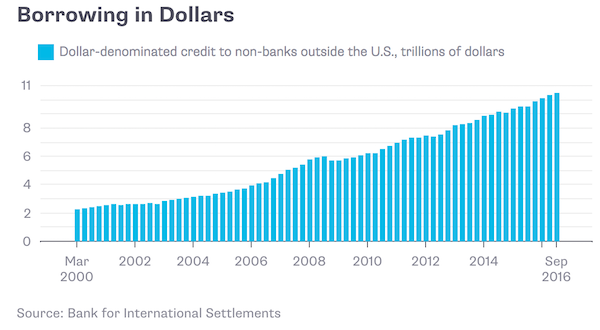
If the Fed sticks with its plan of raising rates more than a percentage point by the end of next year, the increased interest costs could stunt growth and weigh on borrowers’ finances in places as far flung as the U.K. and China. It could also mean losses for investors holding the debt, particularly given that the duration of dollar-denominated bonds – a measure of their price sensitivity to changes in interest rates – is close to its highest point in at least two decades. An increase of 1 percentage point, for example, would take $500 billion off the value of the bonds included in the Bank of America Merrill Lynch U.S. Dollar Global Corporate and High Yield Index. Here’s a chart showing how that number has changed over the years (thanks to a combination of increased dollar debt and increased duration):
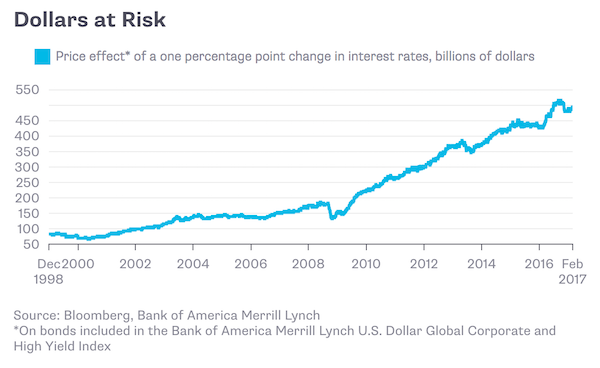

Next up: falling demand.
• Oil Drops On Rising Us Drilling, Failing OPEC Cuts (R.)
Oil prices fell on Monday, with already-bloated markets pressured by rising U.S. drilling activity and steady supplies from OPEC countries despite touted production cuts. Prices for benchmark Brent crude futures were 35 cents, or 0.68%, below their last settlement at 0646 GMT, at $51.41 per barrel. U.S. West Texas Intermediate (WTI) crude futures were down 46 cents, or 0.94%, at $48.32 a barrel. Traders said that prices came under pressure from rising U.S. drilling and ongoing high supplies by OPEC despite its pledge to cut output by almost 1.8 million barrels per day (bpd) together with some other producers like Russia.
“There is good, strong momentum to the downside,” futures brokerage CMC Markets said in a note on Monday. U.S. drillers added 14 oil rigs in the week to March 17, bringing the total count up to 631, the most since September 2015, energy services firm Baker Hughes Inc said on Friday, extending a recovery that is expected to boost shale production by the most in six-months in April. Sukrit Vijayakar of energy consultancy Trifecta said the rising drilling activity was “reinforcing the expectation of higher U.S. production offsetting (OPEC’s) supply cuts”. U.S. oil output has risen to over 9.1 million bpd from below 8.5 million bpd in June last year.

“..for the likes of Rudd, “Never forget” means “Don’t forget for two weeks” or, if politically expedient, “Don’t forget for three days”.
“The reason they can never answer the question, ‘How could it [the Holocaust] possibly happen?’ is that it’s the wrong question. Given what people are, the question is, ‘Why doesn’t it happen more often?’”
• Smile For The Auschwitz Selfie: Why Holocaust Memorials Have Failed (NS)
It is time to say that attempts to memorialise the Holocaust have failed and may even be counterproductive. The dead are still dead; anti-Semitism still exists and sometimes thrives. Myths of Jewish power circulate, now with the added insult of “playing the Holocaust card (that you presumably picked up at a Holocaust memorial gift shop)”. A clutch of these memorials, all counselling kindness to the refugee, could not save Aylan Kurdi, a three-year-old Syrian boy, from drowning in the Mediterranean Sea in 2014. In January the Home Secretary, Amber Rudd, posted a picture of herself signing a Holocaust remembrance book on Twitter. “We must never forget,” she wrote. It reminded me of my favourite line from the 1986 Woody Allen film Hannah and Her Sisters: “The reason they can never answer the question, ‘How could it [the Holocaust] possibly happen?’ is that it’s the wrong question. Given what people are, the question is, ‘Why doesn’t it happen more often?’”
Two weeks later, Rudd announced that the “Dubs amendment” – which aimed to offer sanctuary to solitary child refugees and was sponsored by Lord Dubs, who came to the UK from Czechoslovakia on the Kindertransport in March 1939 – would be discontinued after resettling just 350 children. (Even the Cameron government, no friend to the vulnerable, suggested that it could take about 3,000.) I do not expect Rudd to know that, in response to the Évian Conference on Jewish refugees, held in France in 1938, Adolf Hitler offered German Jews to the world but the world did not want them. Britain took 10,000 children, sponsored privately, and left their parents to die. After 1945, Britain agreed to take another 1,000 Jewish children but it could not find 1,000 still alive. It took 732. I now see that, for the likes of Rudd, “Never forget” means “Don’t forget for two weeks” or, if politically expedient, “Don’t forget for three days”.
But if that’s what you think, you never knew anything to forget. Rudd couldn’t see the connection between the British government of 1938 leaving children to die in far-off lands and the British government of 2016 doing the same. Her signing of a Holocaust remembrance book was so meaningless that it was, at best, hand exercise and, at worst, a cynical PR gesture. This act of Holocaust memorialising was a failure. I hope that Rudd is prevented from approaching any Holocaust-related stationery in future. But that won’t happen. The orthodoxy in these circles is: let them all come to bear witness, no matter what they do with it. Some of them might learn something. This policy led to a friend hearing a young Polish boy, touring Auschwitz, describe a fellow visitor as “a rich Jewish bitch in all that jewellery”. The boy had learned nothing, but the man had. He punched him in the face, and that is the only cheerful anecdote in this article.

Maybe Germany and the US should make this very clear: “..the head of the BND foreign intelligence agency, who said the Turkish government had failed to convince it that Muslim cleric Fethullah Gulen was responsible for the coup attempt.”
• Spy Comments Proof Germany Supports Group Behind Attempted Coup: Erdogan (R.)
Doubts expressed by Germany’s spy agency regarding the role of a U.S.-based cleric in last year’s attempted coup in Turkey are proof that Berlin supports the organization behind the attempt, Turkish President Tayyip Erdogan’s spokesman said on Sunday. Ibrahim Kalin made the comment in a live interview with broadcaster CNN Turk. On Saturday, German news magazine Der Spiegel published an interview with the head of the BND foreign intelligence agency, who said the Turkish government had failed to convince it that Muslim cleric Fethullah Gulen was responsible for the coup attempt. “Turkey has tried to convince us of that at every level but so far it has not succeeded,” Bruno Kahl was quoted as saying. Kalin said those comments were proof that Berlin supported the coup. Germany and Turkey have been locked in a deepening diplomatic row after Berlin banned some Turkish ministers from speaking to rallies of expatriate Turks ahead of a referendum next month, citing public safety concerns.

Erdogan needs an enemy to ‘protect’ his people from, or he won’t win the referendum.
• Erdogan Accused Merkel Of Using Nazi Methods (DW)
Ankara launched a new wave of anti-German rhetoric on Sunday, with President Recep Tayyip Erdogan calling out the German chancellor in a televised speech. “When we call them Nazis, they (Europe) get uncomfortable. They rally together in solidarity. Especially Merkel,” Erdogan said. “But you are right now employing Nazi measures,” he said, addressing Merkel directly and using the unofficial, personal way of saying “you” in Turkish. Erdogan has previously accused both the Netherlands and Germany of acting like Nazis after the two countries prevented Turkish ministers from holding campaign rallies on their territory. In his Sunday speech, Erdogan accused Merkel personally of using Nazi methods against his “Turkish brother citizens in Germany and brother ministers.”
The row with Europe “showed that a new page had been opened in the ongoing fight against our country,” he added. Berlin was decidedly not amused, saying that the Turkish president had “gone too far.” Foreign Minister Sigmar Gabriel told the Passauer Neue Presse that he warned Ankara against continuing this “shocking” rhetoric. “We are tolerant but we’re not stupid,” Gabriel said. “That’s why I have let my Turkish counterpart know very clearly that a boundary has been crossed here.” Ankara also responded furiously to a Kurdish rally in Frankfurt yesterday, where participants carried flags and symbols of the outlawed Kurdistan Workers’ Party (PKK) and called for a ‘no’ on the upcoming referendum. The Turkish government said the rally showed Berlin’s hypocrisy after halting similar events for the ‘yes’ camp. They also summoned the German ambassador over the incident.

Someone should shut up Dijsselbloem. When you lose as big as he did in last week’s elections, you need to pipe down, disappear.
• Dijsselbloem Calls For ESM To Be Turned Into A European IMF (R.)
The European Stability Mechanism (ESM) – the euro zone’s bailout fund – should ultimately be turned into a European version of the International Monetary Fund, the head of euro zone finance ministers told a German newspaper. “I think it would make a lot of sense for the euro zone bailout fund ESM to be developed into a European IMF in the medium to long term,” Jeroen Dijsselbloem told Monday’s edition of Frankfurter Allgemeine Zeitung. He said that would also mean that Greece’s current “troika” of lenders – the European Commission, ECB and the IMF – would need to be broken up in the longer term. “The ECB feels increasingly uncomfortable in its troika role, and rightly so I think,” Dijsselbloem said, adding that the European Commission had other “important tasks” that it should concentrate on.He said the ESM should “build up the technical expertise that only the IMF has at the moment”.
German Finance Minister Wolfgang Schaeuble has also proposed turning the ESM into a European monetary fund to improve the management of crises in Europe. Dijsselbloem said the institutions should maintain their roles for Greece’s current bailout and said he still expected the IMF to decide on a new programme, adding that it would be “most welcome” if this happened by the summer. Germany, which holds elections in September, wants the IMF on board before new money is lent to Athens. But it disagrees with the IMF over debt relief and the fiscal targets that Greece should maintain after the bailout programme ends in 2018. Dijsselbloem said he did not expect the current review of Greece’s bailout programme to be concluded quickly, adding that he did not think the institutions will complete it before a Eurogroup meeting in Malta in April.

From a Jacobin article on the Dutch elections. Yeah, as I said last week, they’re trying to find ways to allow Dijsselbloem to ‘finish the job’ of finishing off Greece.
Under the current government, the PvdA’s rightward shift took on a whole new meaning. The party gained significant ground during the 2012 elections by arguing that a vote for Labour was the only way to avoid a VVD-led austerity government. Immediately after the elections, the party turned around and started negotiating the formation of a coalition with those very opponents. This government launched a massive austerity program, entailing almost fifty billion euros in cutbacks. PvdA ministers prided themselves on taking some of the most difficult posts, including social affairs and employment (PvdA leader Lodewijk Asscher) and finance (Jeroen Dijsselbloem).
A PvdA minister of the interior loyally executed the VVD’s anti-refugee policies. And Dijsselbloem not only enthusiastically applied the European Union’s fiscal stringency to the Netherlands but, as chairman of the Eurogroup, became its main enforcer against the Syriza government. Nothing could more fully demonstrate the PvdA’s neoliberal drift than the fact that Alexander Pechtold, leader of the liberal-democratic party Democrats 66 (D66), repeatedly suggested Dijsselbloem could continue to represent the Netherlands in Brussels “so that he can finish the job.” [..] The same anger and anxieties that created violent shocks to the political system — of which the PvdA’s collapse is only the latest example — also continue to drive large numbers to vote for allegedly safe parties that they wrongly believe will at least not make things worse.

Greece spends more on pensions because it is the only fallback the economy has, they play the role that in other countries is played by unemployment benefits. The Troika knows this very well. It’s hard not to conclude that the lenders are trying to create a civil war in Greece.
• Greece Edges Toward Another Bailout Crisis (BBG)
Greece is set to miss yet another deadline for unlocking bailout funds this week, edging closer to a repeat of the 2015 drama that pushed Europe’s most indebted state to the edge of economic collapse. Euro-area finance ministers meeting in Brussels on Monday will reiterate that the government of Alexis Tsipras has yet to comply with the terms attached to the emergency loans that have kept the country afloat since 2010. While Tsipras had promised the long delayed review of the latest bailout would be completed by March 20, a European official said last week that reaching an agreement even in April is now considered a long shot. The two sides are still far apart on reforms demanded by creditors in the Greek energy market and the government in Athens is resisting calls for additional pension cuts. And while discussions continue on how to overhaul the labor market, a finance ministry official said in an email to reporters on Friday that the issue can’t be solved in talks with technocrats.
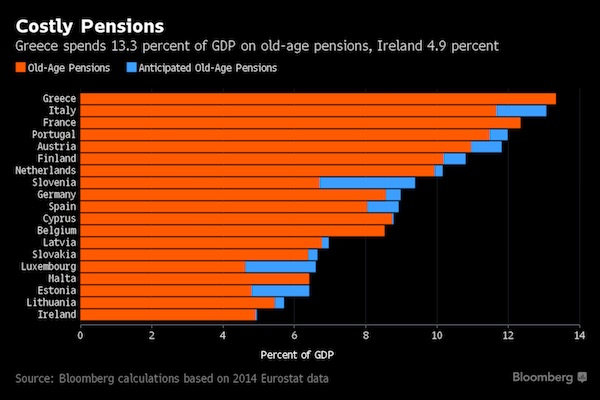
Stalled bailout reviews and acrimony between successive governments and auditors representing creditor institutions are all too familiar themes in the seven-year crisis that has reduced the Greek economy by a quarter. Failure to resolve the latest standoff before the summer could mean that Greece may not be able to meet debt payments due in mid-July. Even as Greek bonds have performed better than most of its euro-area peers this year on expectations that the government will capitulate, uncertainty has weighed on economic activity, raising the risk that an additional bailout may be needed. Unemployment rose in the last quarter of 2016, the economy unexpectedly contracted, and a bleeding of deposits from the nation’s battered lenders resumed.

Daniel Howden is a senior editor at Refugees Deeply. Good piece, but very incomplete. I’ll get back to that.
• How Millions In Refugee Funds Were Wasted In Greece (K.)
For a story of waste and suffering, it’s notable that some of the worst decisions in response to the refugee crisis in Greece were born of good intentions. An archipelago of some 50 small refugee camps was scattered over Greece in preference to concentrating asylum seekers in larger ghettos. As an idea it had merits. In practice it was disastrous. Authorities still struggle to say how many camps there are. The Ministry of Migration Policy lists 39 but the UN says there may be more than 50. Many of these sites, which are in various states of closure, were clearly unfit for human habitation in the first place. The choice to build so many of them multiplied infrastructure costs for things like sewage systems built on private property or remote sites that will serve no public purpose in the future. Meanwhile, the Public Power Corporation is building substations at sites that will likely face closure.
The European Commission and its humanitarian operations agency ECHO are expected to cease support for all but 10 of Greece’s mainland camps in the near future. As the main donor, this will be decisive. There is similar confusion over how many asylum seekers remain in Greece from the 1.03 million who entered in 2015-16. Again the ministry and the UN disagree, with the former saying 62,000 and the latter nearer 50,000. European officials say privately that both numbers are overestimates. This shroud of confusion has contributed to a mess that will be remembered as the most expensive humanitarian response in history. Some $803 million flowed into Greece from the beginning of 2015, according to an investigation by Refugees Deeply, an independent reporting platform. The bulk of these funds were meant to be spent on services for the 57,000 refugees and migrants stranded in Greece when the borders shut one year ago. That translates to a rough cost per beneficiary of $14,000.
Nobody believes this has been money well spent. One senior aid official admitted that as many as $70 out of every $100 spent had been wasted. As anyone who followed the response in Haiti or Kosovo would affirm, the aid industry is inherently wasteful but this was excessive. The scale of this became obvious from November onward when refugees were pictured in tents in the snow and it sparked a blame game. None of the actors emerge with much credit. The UN refugee agency played mute witness to failures in refugee protection for fear of offending its second largest donor, the EU. The European Commission was content to make grandiose statements that exaggerated the funding it had committed, while doing nothing to correct the mistakes it witnessed on the ground. It also made promises on asylum service assistance that were not kept. The bigger the mess in Greece, the greater the deterrent and the stronger the message to future asylum seekers not to come this way.

Wonderful. There is still hope. There are still people, even in governments, who are still people.
• Avoiding Risky Sea Journey, Syrian Refugees Head To Italy ‘Pronto’ (AFP)
Just before midnight in a sleepy district of Beirut, dozens of Syrian refugees huddle in small groups around bulging suitcases, clutching their pinging cellphones and one-way tickets to Italy. “Torino! Pronto! Cappuccino!” They practise random Italian words in a schoolyard in the Lebanese capital’s eastern Geitawi neighbourhood, waiting for the buses that will take them to the airport, and onwards to their new lives in Italy. Under an initiative introduced last year by the Italian government, nearly 700 Syrian refugees have been granted one-year humanitarian visas to begin their asylum process in Italy. The programme is the first of its kind in Europe: a speedy third way that both avoids the United Nations lengthy resettlement process and provides refugees with a safe alternative to crammed dinghies and perilous sea crossings.
[..] A country of just four million people, Lebanon hosts more than one million Syrian refugees. For members of Mediterranean Hope, the four-person team coordinating Italy’s resettlement efforts from Lebanon, “humanitarian corridors” are the future of resettlement. The group interviews refugees many times before recommending them to the Italian embassy, which issues humanitarian visas for a one-year stay during which they begin the asylum process for permanent resettlement. “It’s safe and legal. Safe for them, legal for us, says Mediterranean Hope officer Sara Manisera. “After people cross the Mediterranean on the journey of death, they are put into centres for months while they wait. But with this programme, there are no massive centres, it costs less, and refugees can keep their dignity,” she tells AFP.

Beware better weather conditions.
• 3,000 Migrants Rescued Off Libya On Sunday (AFP)
Around 3,000 migrants were rescued off the coast of Libya on Sunday as they tried to cross the Mediterranean to Europe, the Italian coast guard told AFP. “After some calm days, migrants are arriving in large numbers, taking advantage of a window of favorable weather,” said a coast guard official. The rescue was undertaken in 22 separate operations coordinated by the Italian coast guard. One participant was the Aquarius, a humanitarian ship run by the NGO SOS Mediterranean and Doctors Without Borders (MSF), which said it saved 946 people, including 200 unaccompanied minors. An MSF video showed three young children smiling and dancing on the ship to the sound of drumming. The migrants rescued by the Aquarius had been found drifting on nine wooden and rubber boats. According to the Italian government, 16,206 people have been rescued in the sea by Friday — compared to 11,911 by the same time last year.









Home › Forums › Debt Rattle March 20 2017